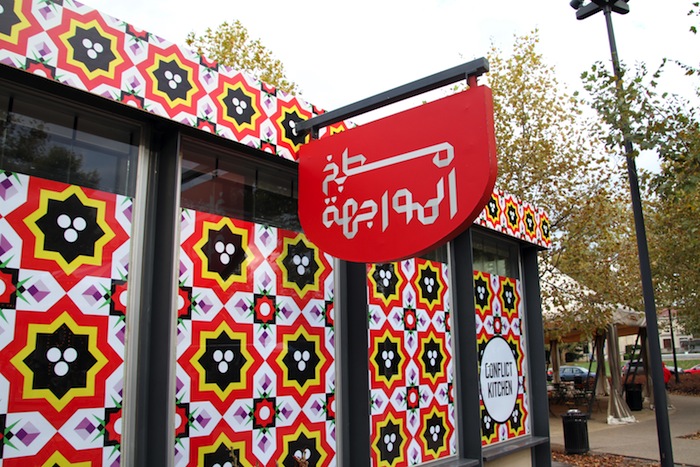Created as a tool to foster understanding, Pittsburgh’s Conflict Kitchen, which serves cuisine from countries with which the US is in conflict, has shut down after receiving death threats over texts dubbed “anti-Israel” by critics. Printed on food wrappers, the texts featured excerpts from interviews with Palestinians and covered cultural and political topics, from olive trees to the Palestinian Authority and settlements. In a statement to critics, the restaurant wrote, “Perhaps it is hard for some people to hear that Palestinians are not happy with Israeli policies or the actions of some of its citizens, but to cast their viewpoints as simply anti-Israel is to reinforce the simplest, most polarizing, and dehumanizing reading of their lives and perpetuate the silencing of their voices.”
- For the first time, e-flux has dedicated an entire issue of its journal to a single artist: the late Harun Farocki. Among reflections on the celebrated artist are experimental geographer and Citizenfour cinematographer Trevor Paglen, who looks at Farocki’s Eye/Machine, a composition of machine-configured images meant to show humans a machine’s perspective. However, nowadays these machine-made “operational images are overwhelmingly invisible, even as they’re ubiquitous and sculpting physical reality in ever more dramatic ways,” writes Paglen, emphasizing that Eye/Machine has become a key departure point for artists to further investigate how invisible images control us.
- Finally, promising news for Detroit: A federal judge has approved a plan that’ll end the largest municipal bankruptcy in US history. It’ll cut more than $7 billion in unsecured liabilities and reinvest $1.4 billion in public services, preventing the sale of art from the Detroit Institute of Arts’ collection.
- From cancer-fighting “DNA origami” to bacteria programmed to find internal anomalies, synthetic biology may be poised to revolutionize science. But despite its relevance in humanistic solutions, it poses ethical concerns. Speaking about the manipulation of existing ecosystems, artist Daisy Ginsberg asks: “If nature is totally industrialized for the benefit of society — which for some is the logical endpoint of synthetic biology — will nature still exist for us to save?”
- Ken Johnson’s withering emphasis on domesticity over artistic rigor in his review of Michelle Grabner’s new work highlights “the most consistent problems that women face: critics conflating their life and work rather than evaluating the work on its own terms,” writes Hyperallergic’s Jillian Steinhauer.
- Like other artists, pianist Dejan Lazic is subject to bad reviews. But unlike most, he’s asking for a clean slate: Lazic has requested The Washington Post to remove a review criticizing his 2010 performance under the European Union’s “right to be forgotten online” ruling. Claiming that the review has marred the first pages of his Google results for years,” Lazic says his request deals with the control of his personal image, or as he puts it, “the truth”—which raises a rather difficult question: Who decides whose truth is right?
- “Exploitation is your name!” shouted GULF Labor activists in front of the Guggenheim as donors arrived for the International Gala. The previous day, protesters unfurled a banner inside the museum to mark the beginning of its “Countdown” campaign. The renewed protests seeks to educate the donors about the mistreatment of migrant workers building Guggenheim’s new Abu Dhabi branch.
Follow Art News From Elsewhere on the Walker Art Center homepage or via @walkermag, the Walker’s editorial-focused Twitter feed.




